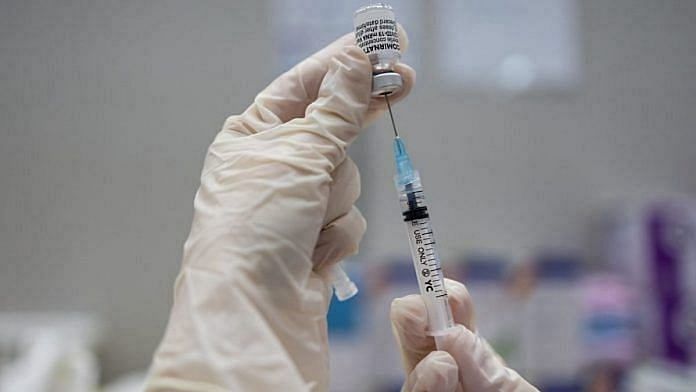New Delhi: A new Covid vaccine developed in Germany, called CoVac-1, can induce a robust immune response in 93 per cent of immunocompromised patients, including those with leukaemia and lymphoma, the team of German researchers who developed the vaccine has claimed.
Results of the trial conducted by the researchers were presented at the American Association for Cancer Research (AACR) Annual Meeting 2022 Tuesday.
CoVac-1 is a peptide-based vaccine — the first Covid vaccine designed specifically to get better immune responses from immunocompromised patients, the research team from the University of Tübingen said.
The Covid vaccines approved for use so far induce a robust immune response against the SARS-CoV-2 virus in a majority of individuals, but they have shown decreased efficacy in many immunocompromised people, researchers said.
Patients undergoing treatment for blood cancers represent one such population, as their treatment regimens often damage healthy immune cells, particularly B-cells, they added
B-cells are a type of white blood cells that play a significant role in the body’s adaptive immune system, which is responsible for creating specialised antibodies that attack pathogens.
Most vaccines contain a part of the virus that tricks the body into thinking that it has been infected. This causes the body’s natural immune system — including the B-cell response — to kick in, the researchers said. However, many chemotherapies and some immunotherapies destroy B-cells, the immune cells responsible for humoral or antibody-mediated responses.
Also Read: As Omicron variant XE surfaces in India, here’s what you need to know about the Covid strain
What is a peptide-based vaccine?
CoVac-1 is a peptide-based vaccine, meaning that the protein pieces are injected directly, rather than being encoded via mRNA.
Peptide-based vaccines are made of small parts of proteins taken from the pathogen, rather than the entire inactivated pathogen or a protein.
Currently, approved SARS-CoV-2 vaccines rely heavily on humoral responses, which may be impaired in patients with a B cell deficiency. One way to compensate for this is to enhance the response from T-cells, another type of immune cell.
“T-cell immune responses against SARS-CoV-2 are of particular importance for patients with B-cell deficiencies, who develop very limited antibody responses after infection or vaccination,” said Claudia Tandler, a graduate student at the University of Tübingen, and one of the researchers on the project.
“T-cell mediated immunity is indispensable for developing protective antiviral responses, and previous evidence has shown that T-cells can combat Covid-19 even in the absence of neutralising antibodies,” Tandler said in a statement.
“To our knowledge, CoVac-1 is currently the only peptide-based vaccine candidate specifically developed and evaluated for immunocompromised patients,” said Juliane Walz, a professor of peptide-based immunotherapy at the University Hospital Tübingen.
“In the clinic, we see many cancer patients who do not mount sufficient humoral immune responses after vaccination with available SARS-CoV-2 vaccines,” Walz said. “These patients are thus at a high risk for a severe course of Covid-19.”
Designing a vaccine to stimulate T-cells, Tandler explained, requires the careful selection of SARS-CoV-2 antigens, which are small pieces of viral proteins that can stimulate immune cells.
While the current mRNA-based vaccines produce a larger piece of a single protein — the spike protein — which our cells can break down into antigens, the German team chose six specific antigens from different parts of the virus to make their vaccine.
“CoVac-1-induced T-cell immunity is far more intense and broader, as it is directed to different viral components than mRNA-based or adenoviral vector-based vaccines that are limited to the spike protein and are thus prone to loss of activity due to viral mutations,” Tandler said.
Also Read: Mental health effects of severe Covid could last up to 16 months, Lancet study finds
Better immune response
The researchers had previously tested the safety and preliminary efficacy of CoVac-1 in individuals without immune deficiency and found that all those who received the vaccine maintained robust T-cell responses three months after vaccination. This included responses against Omicron and other SARS-CoV-2 variants of concern, the researchers said.
The team then decided to carry out phase I/II clinical trials in immunocompromised patients.
In the phase I of this trial, the researchers recruited 14 patients with a B-cell deficiency, including 12 patients with leukaemia or lymphoma. The patients were given a single dose of CoVac-1 and monitored for up to six months.
As many as 64 per cent of the patients in this study had been previously vaccinated with an approved SARS-CoV-2 vaccine that failed to elicit a humoral immune response, the researchers said.
Fourteen days after vaccination, T-cell immune responses were observed in 71 per cent of patients, which rose to 93 percent of patients 28 days after vaccination, the researchers said.
The researchers also found that CoVac-1-induced T-cell responses were better than what was observed in B-cell-deficient patients after vaccination with mRNA vaccines.
T-cell responses from CoVac-1 also exceeded those mounted by individuals who are not immunocompromised following a SARS-CoV-2 infection, the researchers said.
The researchers are currently preparing a phase III clinical trial to evaluate CoVac-1 in a larger population of immunocompromised individuals.
(Edited by Uttara Ramaswamy)



